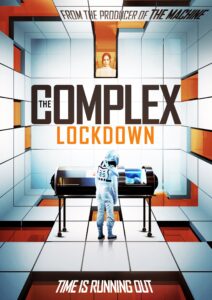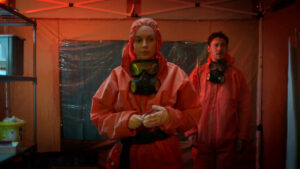Film Review: “The Complex: Lockdown” Deviates from its Interactive Video Game Roots and Suffers the Consequences
Written by: Adam Vaughn | October 13th, 2020

The Complex: Lockdown (Paul Raschid, 2020) 2 out of 4 stars.
Very rarely does a video game-based film rise to the occasion and match (or surpass) the quality and visual awe of its predecessor, often falling short and creating a less appealing version of the story. With The Complex: Lockdown, director Paul Raschid (White Chamber) has chosen to omit the “interactive” element that made The Complex a unique video-game experience, and bring the narrative into a strict, cinematic form. Visually, this directorial choice keeps the appealing aesthetic of the preceding video game. Narratively, it does the story a huge disservice.
The Complex: Lockdown tells the tale of scientist Dr. Amy Tenant (Michelle Mylett, El Camino Christmas) as she tackles the deadly outbreak of a nano-cell organism gone wrong, all the while battling a terrorist organization attempting to obtain that nano-cell. Alongside her associate, Dr. Rees Wakefield (Al Weaver, Colette), the two fight against time and the deadly forces around them to stop the nano-cell from reaching the outside world. The film captures a stunning depiction of a near-future sci-fi setting, with attention to visual detail and compelling color composition. The balance of both intricate, but also subtle, set designs works together to delineate the various scientific settings in the film, from the high-tech meeting rooms to the sterile, technologically advanced laboratory areas. The costume designs complement the aesthetic further, creating a state-of-the-art scientific feel. On this visual scale, The Complex: Lockdown succeeds.

Where the film falls short is the script and how much it strays from the source material. The Complex was unique in allowing the viewer to interact with the action and suspense by making decisions that determined the narrative, creating multiple outcomes. While the concept of a tell-tale interactive experience remains primarily a video-game platform, various cinematic works have adapted this style of storytelling (Black Mirror: Bandersnatch, Unbreakable Kimmy Schmidt: Kimmy vs the Reverend, etc.). As an ordinary film, The Complex: Lockdown is bland and unoriginal, following a predictable revenge plot, and delivering very few surprising or logical plot points.
Should this film have taken an interactive route, it would have been the first of its kind in many ways, being able to surprise the viewer by his/her own decisions, and becoming truly unpredictable for the audience. Given that Raschid chose to create a straight narrative, The Complex: Lockdown lacks in original storytelling, and has little to offer the sci-fi genre beyond a loose, lackluster depiction of the franchise, relying on overly dramatic performances and unconvincing stakes and tension. The result is a less-than-satisfying narrative journey, and a bleak one at that.


